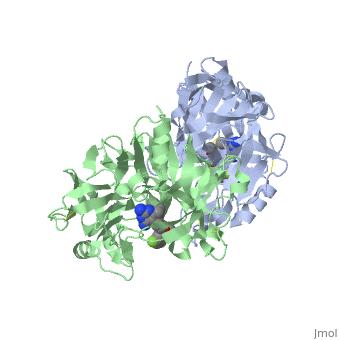We apologize for Proteopedia being slow to respond. For the past two years, a new implementation of Proteopedia has been being built. Soon, it will replace this 18-year old system. All existing content will be moved to the new system at a date that will be announced here.
2i4q
From Proteopedia
(Difference between revisions)
| Line 1: | Line 1: | ||
| - | + | ==Human renin/PF02342674 complex== | |
| - | === | + | <StructureSection load='2i4q' size='340' side='right' caption='[[2i4q]], [[Resolution|resolution]] 2.30Å' scene=''> |
| - | + | == Structural highlights == | |
| + | <table><tr><td colspan='2'>[[2i4q]] is a 2 chain structure with sequence from [http://en.wikipedia.org/wiki/Homo_sapiens Homo sapiens]. Full crystallographic information is available from [http://oca.weizmann.ac.il/oca-bin/ocashort?id=2I4Q OCA]. For a <b>guided tour on the structure components</b> use [http://oca.weizmann.ac.il/oca-docs/fgij/fg.htm?mol=2I4Q FirstGlance]. <br> | ||
| + | </td></tr><tr><td class="sblockLbl"><b>[[Ligand|Ligands:]]</b></td><td class="sblockDat"><scene name='pdbligand=UA4:(2S)-6-(2,4-DIAMINO-6-ETHYLPYRIMIDIN-5-YL)-2-(3,5-DIFLUOROPHENYL)-4-(3-METHOXYPROPYL)-2-METHYL-2H-1,4-BENZOXAZIN-3(4H)-ONE'>UA4</scene><br> | ||
| + | <tr><td class="sblockLbl"><b>[[Related_structure|Related:]]</b></td><td class="sblockDat">[[2g24|2g24]], [[2g21|2g21]], [[2g1s|2g1s]]</td></tr> | ||
| + | <tr><td class="sblockLbl"><b>[[Gene|Gene:]]</b></td><td class="sblockDat">REN ([http://www.ncbi.nlm.nih.gov/Taxonomy/Browser/wwwtax.cgi?mode=Info&srchmode=5&id=9606 Homo sapiens])</td></tr> | ||
| + | <tr><td class="sblockLbl"><b>Activity:</b></td><td class="sblockDat"><span class='plainlinks'>[http://en.wikipedia.org/wiki/Renin Renin], with EC number [http://www.brenda-enzymes.info/php/result_flat.php4?ecno=3.4.23.15 3.4.23.15] </span></td></tr> | ||
| + | <tr><td class="sblockLbl"><b>Resources:</b></td><td class="sblockDat"><span class='plainlinks'>[http://oca.weizmann.ac.il/oca-docs/fgij/fg.htm?mol=2i4q FirstGlance], [http://oca.weizmann.ac.il/oca-bin/ocaids?id=2i4q OCA], [http://www.rcsb.org/pdb/explore.do?structureId=2i4q RCSB], [http://www.ebi.ac.uk/pdbsum/2i4q PDBsum]</span></td></tr> | ||
| + | <table> | ||
| + | == Disease == | ||
| + | [[http://www.uniprot.org/uniprot/RENI_HUMAN RENI_HUMAN]] Defects in REN are a cause of renal tubular dysgenesis (RTD) [MIM:[http://omim.org/entry/267430 267430]]. RTD is an autosomal recessive severe disorder of renal tubular development characterized by persistent fetal anuria and perinatal death, probably due to pulmonary hypoplasia from early-onset oligohydramnios (the Potter phenotype).<ref>PMID:16116425</ref> Defects in REN are the cause of familial juvenile hyperuricemic nephropathy type 2 (HNFJ2) [MIM:[http://omim.org/entry/613092 613092]]. It is a renal disease characterized by juvenile onset of hyperuricemia, slowly progressive renal failure and anemia.<ref>PMID:19664745</ref> | ||
| + | == Function == | ||
| + | [[http://www.uniprot.org/uniprot/RENI_HUMAN RENI_HUMAN]] Renin is a highly specific endopeptidase, whose only known function is to generate angiotensin I from angiotensinogen in the plasma, initiating a cascade of reactions that produce an elevation of blood pressure and increased sodium retention by the kidney. | ||
| + | == Evolutionary Conservation == | ||
| + | [[Image:Consurf_key_small.gif|200px|right]] | ||
| + | Check<jmol> | ||
| + | <jmolCheckbox> | ||
| + | <scriptWhenChecked>select protein; define ~consurf_to_do selected; consurf_initial_scene = true; script "/wiki/ConSurf/i4/2i4q_consurf.spt"</scriptWhenChecked> | ||
| + | <scriptWhenUnchecked>script /wiki/extensions/Proteopedia/spt/initialview01.spt</scriptWhenUnchecked> | ||
| + | <text>to colour the structure by Evolutionary Conservation</text> | ||
| + | </jmolCheckbox> | ||
| + | </jmol>, as determined by [http://consurfdb.tau.ac.il/ ConSurfDB]. You may read the [[Conservation%2C_Evolutionary|explanation]] of the method and the full data available from [http://bental.tau.ac.il/new_ConSurfDB/chain_selection.php?pdb_ID=2ata ConSurf]. | ||
| + | <div style="clear:both"></div> | ||
| + | <div style="background-color:#fffaf0;"> | ||
| + | == Publication Abstract from PubMed == | ||
| + | We report the design and synthesis of a series of 6-(2,4-diaminopyrimidinyl)-1,4-benzoxazin-3-ones as orally bioavailable small molecule inhibitors of renin. Compounds with a 2-methyl-2-aryl substitution pattern exhibit potent renin inhibition and good permeability, solubility, and metabolic stability. Oral bioavailability was found to be dependent on metabolic clearance and cellular permeability, and was optimized through modulation of the sidechain that binds in the S3(sp) subsite. | ||
| - | + | Rational design of 6-(2,4-diaminopyrimidinyl)-1,4-benzoxazin-3-ones as small molecule renin inhibitors.,Powell NA, Ciske FL, Cai C, Holsworth DD, Mennen K, Van Huis CA, Jalaie M, Day J, Mastronardi M, McConnell P, Mochalkin I, Zhang E, Ryan MJ, Bryant J, Collard W, Ferreira S, Gu C, Collins R, Edmunds JJ Bioorg Med Chem. 2007 Sep 1;15(17):5912-49. Epub 2007 Jun 2. PMID:17574423<ref>PMID:17574423</ref> | |
| - | + | ||
| - | + | From MEDLINE®/PubMed®, a database of the U.S. National Library of Medicine.<br> | |
| - | + | </div> | |
| - | + | ||
| - | + | ||
| - | + | ||
==See Also== | ==See Also== | ||
| + | *[[CHEM2052 Tutorial Example4|CHEM2052 Tutorial Example4]] | ||
*[[Renin|Renin]] | *[[Renin|Renin]] | ||
| - | + | == References == | |
| - | == | + | <references/> |
| - | + | __TOC__ | |
| + | </StructureSection> | ||
[[Category: Homo sapiens]] | [[Category: Homo sapiens]] | ||
[[Category: Renin]] | [[Category: Renin]] | ||
Revision as of 09:29, 30 September 2014
Human renin/PF02342674 complex
| |||||||||||


